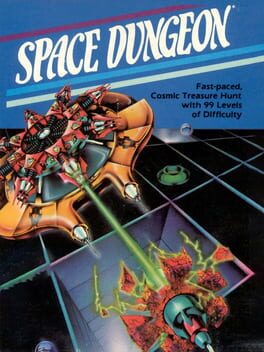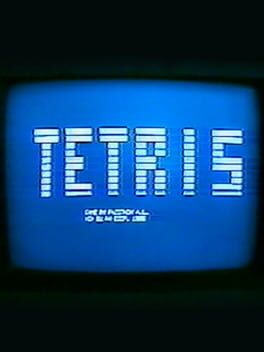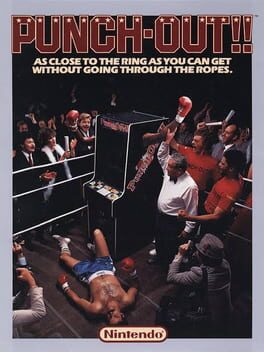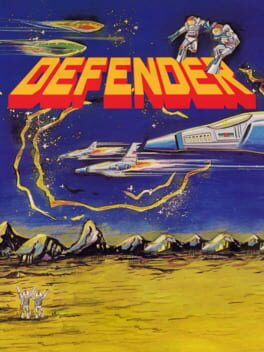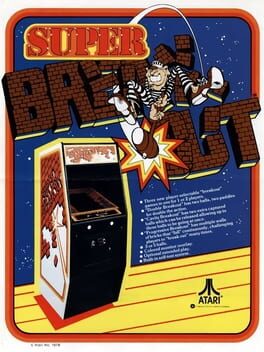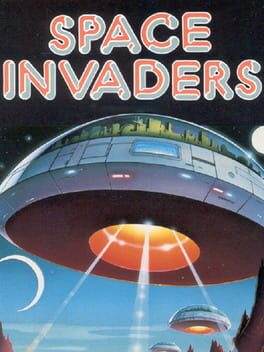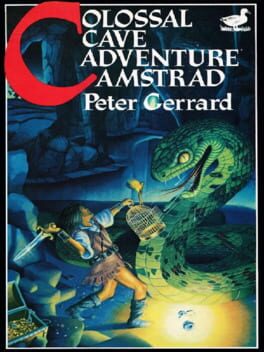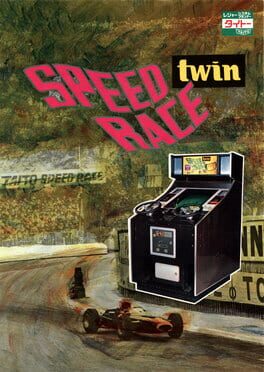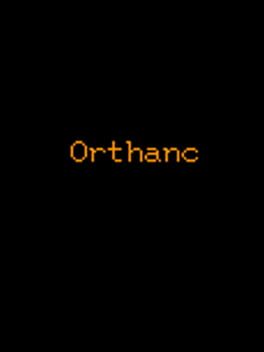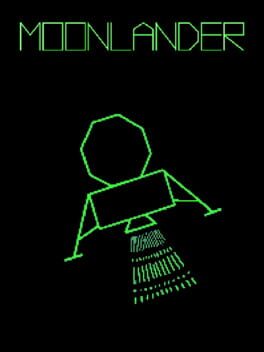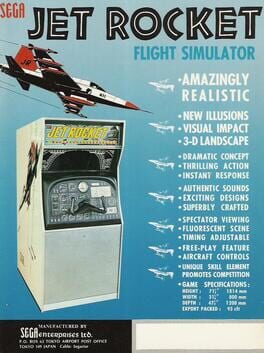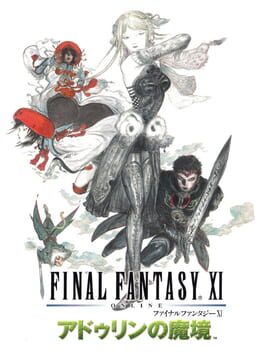DeviousJinjo
1982
1984
Inventor of the real-time score-attack puzzle game (as far as I know) and when accounting for its million quadrillion versions, probably still its king. To be honest, that's not something I can confirm. I respect these plenty, but on the cosmic scale of all video games, this is unavoidably the genre by which I am the least compelled. Is Tetris better than Puyo Puyo? I have no idea. What I do know is that Tetris matters, and that it's good.
1984
While it's far from my personal favorite Nintendo franchise, I consider Punch-Out to be the first of the greats. Donkey Kong and Mario's first outings in the arcades are serviceable, and the Game and Watch games are what they are, and Duck Hunt is a fine enough light gun game, but Punch-Out feels like the first quintessential work of true Nintendo polish and vision. It looks great for the time, and as a well-considered, elaborate, one-on-one boss-rush fighting game, it was something new and visionary. Super Mario Bros might still be a year away, but The Real Nintendo starts right here.
The thing is uhhh... you've played the NES one right? You know that these guys have like, really specific tells and gimmicks that you kind of have to figure out through trial and error or from somebody telling you? Yeah that's a pretty dirty thing to tie to a quarter-munching arcade machine. Good thing none of that's really here yet! I guess?
The thing is uhhh... you've played the NES one right? You know that these guys have like, really specific tells and gimmicks that you kind of have to figure out through trial and error or from somebody telling you? Yeah that's a pretty dirty thing to tie to a quarter-munching arcade machine. Good thing none of that's really here yet! I guess?
1981
1978
Breakout was good, but the three game modes added in its successor are all meaningful improvements. They may only be bells and whistles tied onto Steve Wozniak's technical miracle, but it's the bells and whistles that finally make it sing. Even the Atari home version is good, and EVERYTHING sucks on an Atari console!
1978
While the PLATO RPGs of its time seek to replicate thr systems of Dungeons and Dragons, Colossal Cave Adventure seeks to preserve its humanity. It is a proto-Choose-Your-Own-Adventure book. It is a DnD one-shot wherein the DM is infinitely patient, but barely speaks your language. It is one of the most important video games ever made. Beside the adventure sits a parallel game... one of communication. Accept that relaying your intentions to this robot can be a fun challenge in itself, and find yourself enjoying two games at once.
Colossal Cave Adventure is, at least in my opinion, the first game that is actually about exploring a place. Not just mapping out a level, but searching its crannies and understanding its inner workings. As you can imagine, some of the puzzles in Colossal Cave Adventure are stupid. There are a great number of passageways that only SOMETIMES randomly work, and the "solution" is literally just to try them over and over. In this original text adventure, that means typing a command over and over, not just holding down a button to walk in a direction.
Despite the clunk, this is an admirable first outing with many interesting little twists and turns, and if a slow-paced, dry-witty, more-exploritory, historically-essential version of Kirby Superstar's Great Cave Offensive sounds interesting to you, I'd say you'll probably have a good time!
But I'd also say that you should definitely play the 2023 graphical remake Colossal Cave over the original.
Colossal Cave Adventure is, at least in my opinion, the first game that is actually about exploring a place. Not just mapping out a level, but searching its crannies and understanding its inner workings. As you can imagine, some of the puzzles in Colossal Cave Adventure are stupid. There are a great number of passageways that only SOMETIMES randomly work, and the "solution" is literally just to try them over and over. In this original text adventure, that means typing a command over and over, not just holding down a button to walk in a direction.
Despite the clunk, this is an admirable first outing with many interesting little twists and turns, and if a slow-paced, dry-witty, more-exploritory, historically-essential version of Kirby Superstar's Great Cave Offensive sounds interesting to you, I'd say you'll probably have a good time!
But I'd also say that you should definitely play the 2023 graphical remake Colossal Cave over the original.
1976
1975
1974
1971
Emerged from the primordial soup fully formed and has never once needed to change. Oregon Trail has done so anyway and for the better, but as one of the only good, explicitly educational games to this day, and as something that was AT LEAST ten years ahead of its time, even the original incarnation of Oregon Trail deserves to be forever enshrined as a true cultural achievement.
1973
Lunar Lander, now with fun and lights!
With the addition vector graphics, Moonlander becomes, in my opinion at least, the first game entirely about the mechanics of movement. The Cathode Ray Tube Amusement Device is a game designed around targeting. Space War! features movement of incredible heft and importance that will inspire practically the entire medium of video games including probably Moonlander, but it is ultimately still a game about combat and competition, much like Tennis for Two and its descendants.
Moonlander is an utterly nonviolent game that isn't -really- about achieving a high score, and features no opponent outside of that scoreboard. It is, first and foremost, a game about the satisfaction of successfully manipulating physics.
By modern standards, any version of Lunar Lander feels absolutely ponderous. It feels like the bare skeleton of a video game, presented in slow motion. Nonetheless, Lunar Lander, and by extension Moonlander, is a worthy member of video game's founding pantheon, and to be perfectly frank, it's not like there was much else going on amidst the video games of 1973.
With the addition vector graphics, Moonlander becomes, in my opinion at least, the first game entirely about the mechanics of movement. The Cathode Ray Tube Amusement Device is a game designed around targeting. Space War! features movement of incredible heft and importance that will inspire practically the entire medium of video games including probably Moonlander, but it is ultimately still a game about combat and competition, much like Tennis for Two and its descendants.
Moonlander is an utterly nonviolent game that isn't -really- about achieving a high score, and features no opponent outside of that scoreboard. It is, first and foremost, a game about the satisfaction of successfully manipulating physics.
By modern standards, any version of Lunar Lander feels absolutely ponderous. It feels like the bare skeleton of a video game, presented in slow motion. Nonetheless, Lunar Lander, and by extension Moonlander, is a worthy member of video game's founding pantheon, and to be perfectly frank, it's not like there was much else going on amidst the video games of 1973.
1970
Dude, just look how cool this is. What an awesome feat of mega-early arcade engineering.
https://www.youtube.com/watch?v=D0qlfEuzj6U
I suppose this is as good a place as any to clarify my personal definitions about what is and is not, a video game. Jet Rocket is an electro-mechanical video PROJECTION game, and I count those. Under my definition, a video game is an electronic game that is designed around a video signal output to a screen that needn't be made of glass, by any means including projection. Playing Super Smash Brothers by way of a projector in a movie theater doesn't make it any less a video game. This makes the Cathode Ray Tube Amusement Device my answer for "the first known video game" as it is a fully designed game meeting those criteria, whether a prototype was ever physically made or not. Most games, after all, exist only as information. If you want to render this definition ridiculous, this also means that aiming a laser pointer at the floor and watching the cat pounce at the target is PROBABLY "a video game." It's just a poorly designed one with inconsistent rules. Anyway...
Jet Rocket is, as far as I'm aware, literally the first electrically powered flight simulator game, technically the first FPS video game (Shoot the Bear does not feature anything resembling a screen, though I guess it does at least employ a laser, I think?), and features primordial "in-world" movement in a way that at least qualifies it for consideration as the first "open-world" game. That's a HELL of a resume, and yet somehow we're not all talking about Jet Rocket.
https://www.youtube.com/watch?v=D0qlfEuzj6U
I suppose this is as good a place as any to clarify my personal definitions about what is and is not, a video game. Jet Rocket is an electro-mechanical video PROJECTION game, and I count those. Under my definition, a video game is an electronic game that is designed around a video signal output to a screen that needn't be made of glass, by any means including projection. Playing Super Smash Brothers by way of a projector in a movie theater doesn't make it any less a video game. This makes the Cathode Ray Tube Amusement Device my answer for "the first known video game" as it is a fully designed game meeting those criteria, whether a prototype was ever physically made or not. Most games, after all, exist only as information. If you want to render this definition ridiculous, this also means that aiming a laser pointer at the floor and watching the cat pounce at the target is PROBABLY "a video game." It's just a poorly designed one with inconsistent rules. Anyway...
Jet Rocket is, as far as I'm aware, literally the first electrically powered flight simulator game, technically the first FPS video game (Shoot the Bear does not feature anything resembling a screen, though I guess it does at least employ a laser, I think?), and features primordial "in-world" movement in a way that at least qualifies it for consideration as the first "open-world" game. That's a HELL of a resume, and yet somehow we're not all talking about Jet Rocket.
2023
FFXVI is an absolute heartbreaker, but like all good heartbreakers, it hurts because it's beautiful. Final Fantasy XVI hits you like a thunderbolt with its first impression and then leaves you sick and wanting. It is a game with a miraculous first third, a worrisome middle, and an empty, frustrating end. It is phenomenally localized (in English at least, I can't speak for languages I don't... speak) and marvelously voice acted at all times. Graphically it is a drop-dead gorgeous work of software, even if it is occasionally stuttered by the understandable frame drops that accompany such visuals. Masayoshi Soken continues to prove himself as Uematsu's truest successor as his scores sell these grand feasts of spectacle in ways that so few others ever could. The thrills of FFXVI's combat are enough to place it above many games in the franchise all by itself, and yet despite all of these many marvels, the halls of FFXVI discourse quake tremorously with the darkest of vibes, and I myself am far from untouched.
FFXVI's actual PLOT, more than its characters, more than its dialogue, and more than any other aspect of its writing, is ultimately its kiss of death. Naturally I will refrain from running down my long list of specific missed opportunities, fumbled setups, and outright refusals to explore interesting and important subjects, as this is a spoiler free review. I will however, make sweeping generalized statements about how the script seemingly finds the least interesting possible way to resolve almost every thread the early game so beautifully sets up. Almost every easy lay-up manages to miss the net, and it leaves me genuinely stunned. Its themes are so rote, so mechanically ham-handedly shallow that I spent most of the finale in audible groans. When I say this I am not drawing comparisons to Game of Thrones, Neon Genesis Evangelion, Kaiju films, or any of FFXVI's other legendary inspirations. I'm comparing it to other Final Fantasy games. Truthfully this franchise has some of the best endings in the business. Final Fantasies VI, IX, X, XV, and even many of XI and XIV's expansions by this same team nail their deeply emotional landings so gracefully and flawlessly that they make the end of XVI look like something hastily scrawled in the back of a middle schooler's notebook. It is so trite and inelegant that I fail to enjoy it even on a schlock level. Truly, Final Fantasy XVI is the Fast 8 of the franchise. It is big and dumb and loud and... fun, and awesome.
Much internet text has already been spilled over whether or not FFXVI's combat is Devil May Cry Enough. Devil May Cry is of course renowned for its intrinsically exhilarating combo-based, incredibly flexible combat and its sky-high skill ceiling. To master Devil May Cry V is to study an art. FFXVI's naked imports of Nero's grabby hand, enemy step, helm splitter, stinger, devil trigger and more has led some to declare it as "literally Devil May Cry" and others to bristle at any comparison between the two at all, considering the perceived shallowness to be an insult to or lack of understanding of Devil May Cry. This is much ado about nothing. No, FFXVI is not "literally" Devil May Cry, but it has so much shared DNA that to chastise those making comparisons to it is definite hair-splitting. No, FFXVI does not have "only one combo." It has one basic, bread and butter, build-agnostic combo with tiny variations and a lot of equipable cooldown-based abilities that can be used to extend combos according to the situation at hand. Yes, the skill ceiling is lower because you can't have like ten different weapons with completely different combo sets available on your character at all times. You have to tailor a loadout specific to what you're trying to do. That's the RPG part. After some 50 hours that bread and butter combo definitely starts to feel like not quite enough butter spread over just a little too much bread, but FFXVI is not TRYING to be "literally Devil May Cry", and it's succeeding pretty damned well at exactly what its trying to be. Unfortunately that's not RPG enough for people who didn't get over this stuff back in FFXIII and it's not action enough for DMC mavens... but then again neither is Kingdom Hearts 2, another great action RPG.
Personally, I just wish there was something else to do besides fighting. After also being Full of Shit on The Diversity Issue instead of just owning up to it, Yoshi-P infamously joked (and it was a joke, please chill the fuck out) about the main character of FFXVI having more important things to do than play Blitzball. There has since been a great deal of fixation on a perceived insult to specifically Blitzball (which he only used because it's the example the interviewer cited in the question) rather than the underlying bullshit excuse about Clive being too busy for minigame induced variety. Countless sidequests in this game involve Clive collecting literal dirt, picking literal flowers, traveling halfway across the world to get a bone for his dog to chew on, or just picking up deliveries for his supporting cast when sending anyone else would do just fine. There are extremely obvious times and an extremely obvious place wherein Clive could SO EASILY sit down for a game of setting-appropriate cards with ANY of these characters. Triple Triad would have fit here about a thousand times more gracefully than it does in Final Fantasy VIII. One of the chief reasons that I consider FFXIV to be a better game is because it DOES include these kinds of diversions, even if the quest design of both games is functionally identical. Every quest enters formally into the player's log and involves either talking to a few people, gathering some objects off the ground, fighting some enemies, or some combination of the three. Main quests alternate between show-stopper FFXIV dungeon setpieces (linear environments with bespoke, well designed boss encounters preceded and followed by lavish cutscenes) and the same low-rent filler stuff as the sidequests. I tend not to complain much about sidequests in games, as they are in fact designed to be optional. If you love the game and want an excuse to play more of it, that's what they're there for, just like trophies and/or achievements. Once it becomes a baseline part of any main playthrough however, this becomes a very different conversation. FFXIV gets away with this for multiple reasons. It's an MMO, and the sheer volume of content, the cooperative online novelty, and frankly a lower bar of expectation in the genre makes people far more accepting of that filler. MMOs are marathons, and most players approach them with this understanding. However even as a Final Fantasy XIV player TRYING to convince themselves that they're playing an FFXIV expansion, there are some very important details that render this "one of the bad ones." In modern FFXIV, those kinds of MSQ sections almost always either take place in areas that are new to the player or precipitate some kind of big and interesting development in the story, whether that's an emotional character moment or a climactic plot turn. FFXVI by contrast often sends the player pinging back and forth through tired, familiar locales for the sake of uninteresting drudgery that is not worth the trip. So many of these sections add almost nothing to the overarching story and are only mandatory because some detail must (in the writer's eyes) be laboriously established before it can play into the main plot in some minor way. This is exhausting, and contrasts immensely with the game's grand-slam opening chapters and its occasional over-the-top spectacle setpieces. The sandwich makes the valleys deeper and places greater burdens on the peaks, which often fail to pay off the debt they've been handed, even if they'd be welcomed in isolation.
These story troughs and their matching sidequests are absurdly overwritten. This has come to be a creative signature of Creative Business Unit 3. It is an issue shared by both FFXI and FFXIV. While the dialogue is perfectly competent and does deliver its emotional punches when it needs to, there's simply way the fuck too much of it. Situations that require at most five good lines instead revel in a grossly unnecessary twenty or thirty. It makes SKIPPING that dialogue a near necessity, because listening in full to each fully voiced line is certain to wear the player down to the point that they just skip the sidequests entirely and stop paying attention. This would be a tremendous shame, as the sidequest chains contain essential characterization and tender moments with a supporting cast that otherwise feels bland, lifeless, and underdeveloped. In FFXIV players have the luxury of knowing when to pay attention because any such conversation will be voiced, while anything they don't need to care about is not. In Final Fantasy XVI, almost every single line is voiced, and it frankly feels rude to skip through such expert voicework. Those who always let these experts finish their business however might be claimed by old age before they finish the game.
One such supporting cast member exists to facilitate the crafting system, because Square Enix is definitely not above the pernicious misunderstanding that every single AAA video game REQUIRES some sort of tacked on crafting bullshit in order to succeed. The crafting in FFXVI certainly does not get in the player's way, but that's because it's barely there at all. Crafting materials are the main resource that is found from treasure chests and enemy drops out in the world, and thus should theoretically be used as an incentive for thorough exploration. Unfortunately almost all of these materials are functionally worthless, and accumulating mountains of them will avail the player nothing. There is almost nothing to craft, the recipes don't use many materials, and the game drops free equipment upgrades in your lap so frequently that any boosts earned from crafted gear feel completely trivial... until one gets further down the hunt board. Specific, unique, one-time materials from clearing hunts do combine into worthwhile equipment, but the hunts are clearly arranged into tiers based on when they become available anyway, so the reward could just as easily have been given for clearing each tier. The hunt rewards are just funneled through the crafting system to give it a reason for existing. Does this bother me? In a superficial, petty way, yes. Is it anywhere near as detrimental to the game as its plot or its pacing? Definitely not... but it speaks to a broader issue.
Final Fantasy XVI wears the trappings of many things. It's a Kaiju Mecha Game of Thrones Devil May Cry that revolves around crystals, has crafting, swears a lot, and does the big graphics. Those are some extremely cool things... but FFXVI just feels like a fan of each of them, not a creator in its own right. It's a celebration of those things but it doesn't seem to fully understand any of them, and doesn't have anything insightful to say. In what may very well have been a bid to appear more adult, FFXVI accidentally reveals its shallow childishness in front of the whole school... and yet I can think of at least five less competent Final Fantasies just off the top of my head.
FFXVI's actual PLOT, more than its characters, more than its dialogue, and more than any other aspect of its writing, is ultimately its kiss of death. Naturally I will refrain from running down my long list of specific missed opportunities, fumbled setups, and outright refusals to explore interesting and important subjects, as this is a spoiler free review. I will however, make sweeping generalized statements about how the script seemingly finds the least interesting possible way to resolve almost every thread the early game so beautifully sets up. Almost every easy lay-up manages to miss the net, and it leaves me genuinely stunned. Its themes are so rote, so mechanically ham-handedly shallow that I spent most of the finale in audible groans. When I say this I am not drawing comparisons to Game of Thrones, Neon Genesis Evangelion, Kaiju films, or any of FFXVI's other legendary inspirations. I'm comparing it to other Final Fantasy games. Truthfully this franchise has some of the best endings in the business. Final Fantasies VI, IX, X, XV, and even many of XI and XIV's expansions by this same team nail their deeply emotional landings so gracefully and flawlessly that they make the end of XVI look like something hastily scrawled in the back of a middle schooler's notebook. It is so trite and inelegant that I fail to enjoy it even on a schlock level. Truly, Final Fantasy XVI is the Fast 8 of the franchise. It is big and dumb and loud and... fun, and awesome.
Much internet text has already been spilled over whether or not FFXVI's combat is Devil May Cry Enough. Devil May Cry is of course renowned for its intrinsically exhilarating combo-based, incredibly flexible combat and its sky-high skill ceiling. To master Devil May Cry V is to study an art. FFXVI's naked imports of Nero's grabby hand, enemy step, helm splitter, stinger, devil trigger and more has led some to declare it as "literally Devil May Cry" and others to bristle at any comparison between the two at all, considering the perceived shallowness to be an insult to or lack of understanding of Devil May Cry. This is much ado about nothing. No, FFXVI is not "literally" Devil May Cry, but it has so much shared DNA that to chastise those making comparisons to it is definite hair-splitting. No, FFXVI does not have "only one combo." It has one basic, bread and butter, build-agnostic combo with tiny variations and a lot of equipable cooldown-based abilities that can be used to extend combos according to the situation at hand. Yes, the skill ceiling is lower because you can't have like ten different weapons with completely different combo sets available on your character at all times. You have to tailor a loadout specific to what you're trying to do. That's the RPG part. After some 50 hours that bread and butter combo definitely starts to feel like not quite enough butter spread over just a little too much bread, but FFXVI is not TRYING to be "literally Devil May Cry", and it's succeeding pretty damned well at exactly what its trying to be. Unfortunately that's not RPG enough for people who didn't get over this stuff back in FFXIII and it's not action enough for DMC mavens... but then again neither is Kingdom Hearts 2, another great action RPG.
Personally, I just wish there was something else to do besides fighting. After also being Full of Shit on The Diversity Issue instead of just owning up to it, Yoshi-P infamously joked (and it was a joke, please chill the fuck out) about the main character of FFXVI having more important things to do than play Blitzball. There has since been a great deal of fixation on a perceived insult to specifically Blitzball (which he only used because it's the example the interviewer cited in the question) rather than the underlying bullshit excuse about Clive being too busy for minigame induced variety. Countless sidequests in this game involve Clive collecting literal dirt, picking literal flowers, traveling halfway across the world to get a bone for his dog to chew on, or just picking up deliveries for his supporting cast when sending anyone else would do just fine. There are extremely obvious times and an extremely obvious place wherein Clive could SO EASILY sit down for a game of setting-appropriate cards with ANY of these characters. Triple Triad would have fit here about a thousand times more gracefully than it does in Final Fantasy VIII. One of the chief reasons that I consider FFXIV to be a better game is because it DOES include these kinds of diversions, even if the quest design of both games is functionally identical. Every quest enters formally into the player's log and involves either talking to a few people, gathering some objects off the ground, fighting some enemies, or some combination of the three. Main quests alternate between show-stopper FFXIV dungeon setpieces (linear environments with bespoke, well designed boss encounters preceded and followed by lavish cutscenes) and the same low-rent filler stuff as the sidequests. I tend not to complain much about sidequests in games, as they are in fact designed to be optional. If you love the game and want an excuse to play more of it, that's what they're there for, just like trophies and/or achievements. Once it becomes a baseline part of any main playthrough however, this becomes a very different conversation. FFXIV gets away with this for multiple reasons. It's an MMO, and the sheer volume of content, the cooperative online novelty, and frankly a lower bar of expectation in the genre makes people far more accepting of that filler. MMOs are marathons, and most players approach them with this understanding. However even as a Final Fantasy XIV player TRYING to convince themselves that they're playing an FFXIV expansion, there are some very important details that render this "one of the bad ones." In modern FFXIV, those kinds of MSQ sections almost always either take place in areas that are new to the player or precipitate some kind of big and interesting development in the story, whether that's an emotional character moment or a climactic plot turn. FFXVI by contrast often sends the player pinging back and forth through tired, familiar locales for the sake of uninteresting drudgery that is not worth the trip. So many of these sections add almost nothing to the overarching story and are only mandatory because some detail must (in the writer's eyes) be laboriously established before it can play into the main plot in some minor way. This is exhausting, and contrasts immensely with the game's grand-slam opening chapters and its occasional over-the-top spectacle setpieces. The sandwich makes the valleys deeper and places greater burdens on the peaks, which often fail to pay off the debt they've been handed, even if they'd be welcomed in isolation.
These story troughs and their matching sidequests are absurdly overwritten. This has come to be a creative signature of Creative Business Unit 3. It is an issue shared by both FFXI and FFXIV. While the dialogue is perfectly competent and does deliver its emotional punches when it needs to, there's simply way the fuck too much of it. Situations that require at most five good lines instead revel in a grossly unnecessary twenty or thirty. It makes SKIPPING that dialogue a near necessity, because listening in full to each fully voiced line is certain to wear the player down to the point that they just skip the sidequests entirely and stop paying attention. This would be a tremendous shame, as the sidequest chains contain essential characterization and tender moments with a supporting cast that otherwise feels bland, lifeless, and underdeveloped. In FFXIV players have the luxury of knowing when to pay attention because any such conversation will be voiced, while anything they don't need to care about is not. In Final Fantasy XVI, almost every single line is voiced, and it frankly feels rude to skip through such expert voicework. Those who always let these experts finish their business however might be claimed by old age before they finish the game.
One such supporting cast member exists to facilitate the crafting system, because Square Enix is definitely not above the pernicious misunderstanding that every single AAA video game REQUIRES some sort of tacked on crafting bullshit in order to succeed. The crafting in FFXVI certainly does not get in the player's way, but that's because it's barely there at all. Crafting materials are the main resource that is found from treasure chests and enemy drops out in the world, and thus should theoretically be used as an incentive for thorough exploration. Unfortunately almost all of these materials are functionally worthless, and accumulating mountains of them will avail the player nothing. There is almost nothing to craft, the recipes don't use many materials, and the game drops free equipment upgrades in your lap so frequently that any boosts earned from crafted gear feel completely trivial... until one gets further down the hunt board. Specific, unique, one-time materials from clearing hunts do combine into worthwhile equipment, but the hunts are clearly arranged into tiers based on when they become available anyway, so the reward could just as easily have been given for clearing each tier. The hunt rewards are just funneled through the crafting system to give it a reason for existing. Does this bother me? In a superficial, petty way, yes. Is it anywhere near as detrimental to the game as its plot or its pacing? Definitely not... but it speaks to a broader issue.
Final Fantasy XVI wears the trappings of many things. It's a Kaiju Mecha Game of Thrones Devil May Cry that revolves around crystals, has crafting, swears a lot, and does the big graphics. Those are some extremely cool things... but FFXVI just feels like a fan of each of them, not a creator in its own right. It's a celebration of those things but it doesn't seem to fully understand any of them, and doesn't have anything insightful to say. In what may very well have been a bid to appear more adult, FFXVI accidentally reveals its shallow childishness in front of the whole school... and yet I can think of at least five less competent Final Fantasies just off the top of my head.
Note on all expansions: Every part of FFXI takes an enormous hit in my ratings for existing within the god awful, unconscionable interface, code base, and general design philosophies of FFXI. These things are the foundations of the whole game, and thus no expansion can fully escape these sins. Despite this I have chosen to log them all separately because they are each different beasts.
All of these expansions take a while to get moving, but not like Seekers of Adoulin does. FFXI's final full, paid expansion came after several years of largely unsuccessful mini expansions. A Crystalline Prophecy's story feels like a waste of time and aside from one somewhat interesting mission where the player has their level cap drastically lowered, it doesn't deliver outside of that story either. A Moogle Kupo d'Etat is an agonizing series of fetch quests even more laborious than most of what the earliest eras of the game ask of you, and the comic relief moogle storyline definitely does not have enough punch to carry things. A Shantotto Ascension thankfully does, if players can clear the vicious, hateful crafting hurdles necessary to even start the mission line. The three-part Abyssea scenario is quite transparently just there to give players something to do as it revolves around farming key items with low drop rates from specially spawned monsters which require OTHER low drop rate items from OTHER specially spawned monsters which requi-
So the point is that SE were clearly shifting away from heavy investments in the FFXI content pipeline by this point but weren't willing to give up the subscription model, and that's basically the only excuse I can think of for why Seekers of Adoulin is time-gated all the way to hell and back.
For some reason (slowing you down so you'll stay subscribed longer despite the new development pace) Seekers of Adoulin features three massive walls to halt your progress, all near the start of the story. You can either do what I did and turn the game off for a week in between each of these gates, or you can go through a complicated and gil-intensive song and dance to raise your reputation and reduce the raw time requirement, but farming the gil or materials to do that is going to take its own hefty chunk of time, now isn't it? Even amidst those huge walls are countless smaller ones that demand the player wait until the next in-game day. These were hardly unheard of in FFXI prior to this, but were never half as ubiquitous as they are here.
When the game actually lets you play it, Seekers of Adoulin is good! for FFXI, anyway. It has a lovely story with good characters that is overwritten but emotionally engaging. Its villain is weak, particularly in the wake of Wings of the Goddess, but it hits all of the mythologically and politically intriguing highs that one would hope for in a fantasy tale.
Is it worth wading through hundreds of hours of FFXI to experience? I'm afraid I can't say that it is. It's simply embedded too deeply into a game experience that repulses the sanest parts of humanity, and that's before considering its own more personal issues.
I have asked that same question for each of these FFXI expansions, and the best I have come away with is a "maybe", so can I say that FFXI is worth playing AT ALL? It may come as a surprise, but... yes. While no one part of FFXI makes FFXI worth playing, I cannot say the same of the sum.
I'd rather not try to log them separately and they're not full or paid expansions, so I'll just mention them here. I have not finished the Voracious Resurgence, but Rhapsodies of Vana'diel is what finally pushes me over the line and into the position that yes, if you are an intensely curious Final Fantasy obsessor like myself who is willing to have extremely rough experiences with historically interesting video games, Final Fantasy XI is worth playing. Once.
While this grand expedition has incurred a towering cost in hours, in no way do I consider it to have been a waste of my time. I have come away with SOMETHING new to like about each installment of this game, and I regret nothing.
I will keep any thoughts on Voracious Resurgence to myself. Even if I'm unable to finish it for lack of gear and effort, I imagine that only 2 or 3% of FF players (and likely less in the west) will have played this content which is tacked on after an already immensely satisfying ending half a decade too late, hidden behind 700 hours of a game that's a nightmare even to begin. Allow me this bit of greed with which to keep these secrets safe. Let me keep the illusion that players of this content are essentially Freemasons.
All of these expansions take a while to get moving, but not like Seekers of Adoulin does. FFXI's final full, paid expansion came after several years of largely unsuccessful mini expansions. A Crystalline Prophecy's story feels like a waste of time and aside from one somewhat interesting mission where the player has their level cap drastically lowered, it doesn't deliver outside of that story either. A Moogle Kupo d'Etat is an agonizing series of fetch quests even more laborious than most of what the earliest eras of the game ask of you, and the comic relief moogle storyline definitely does not have enough punch to carry things. A Shantotto Ascension thankfully does, if players can clear the vicious, hateful crafting hurdles necessary to even start the mission line. The three-part Abyssea scenario is quite transparently just there to give players something to do as it revolves around farming key items with low drop rates from specially spawned monsters which require OTHER low drop rate items from OTHER specially spawned monsters which requi-
So the point is that SE were clearly shifting away from heavy investments in the FFXI content pipeline by this point but weren't willing to give up the subscription model, and that's basically the only excuse I can think of for why Seekers of Adoulin is time-gated all the way to hell and back.
For some reason (slowing you down so you'll stay subscribed longer despite the new development pace) Seekers of Adoulin features three massive walls to halt your progress, all near the start of the story. You can either do what I did and turn the game off for a week in between each of these gates, or you can go through a complicated and gil-intensive song and dance to raise your reputation and reduce the raw time requirement, but farming the gil or materials to do that is going to take its own hefty chunk of time, now isn't it? Even amidst those huge walls are countless smaller ones that demand the player wait until the next in-game day. These were hardly unheard of in FFXI prior to this, but were never half as ubiquitous as they are here.
When the game actually lets you play it, Seekers of Adoulin is good! for FFXI, anyway. It has a lovely story with good characters that is overwritten but emotionally engaging. Its villain is weak, particularly in the wake of Wings of the Goddess, but it hits all of the mythologically and politically intriguing highs that one would hope for in a fantasy tale.
Is it worth wading through hundreds of hours of FFXI to experience? I'm afraid I can't say that it is. It's simply embedded too deeply into a game experience that repulses the sanest parts of humanity, and that's before considering its own more personal issues.
I have asked that same question for each of these FFXI expansions, and the best I have come away with is a "maybe", so can I say that FFXI is worth playing AT ALL? It may come as a surprise, but... yes. While no one part of FFXI makes FFXI worth playing, I cannot say the same of the sum.
I'd rather not try to log them separately and they're not full or paid expansions, so I'll just mention them here. I have not finished the Voracious Resurgence, but Rhapsodies of Vana'diel is what finally pushes me over the line and into the position that yes, if you are an intensely curious Final Fantasy obsessor like myself who is willing to have extremely rough experiences with historically interesting video games, Final Fantasy XI is worth playing. Once.
While this grand expedition has incurred a towering cost in hours, in no way do I consider it to have been a waste of my time. I have come away with SOMETHING new to like about each installment of this game, and I regret nothing.
I will keep any thoughts on Voracious Resurgence to myself. Even if I'm unable to finish it for lack of gear and effort, I imagine that only 2 or 3% of FF players (and likely less in the west) will have played this content which is tacked on after an already immensely satisfying ending half a decade too late, hidden behind 700 hours of a game that's a nightmare even to begin. Allow me this bit of greed with which to keep these secrets safe. Let me keep the illusion that players of this content are essentially Freemasons.
